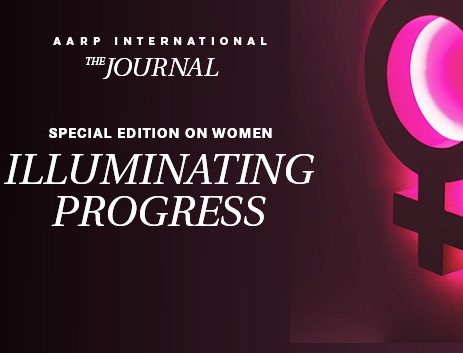 |
AARP International The Journal
Special Edition on Women Illuminating Progress
 Women as Disruptors of Ageing
Jo Ann C. Jenkins
CEO, AARP
Times have changed since Dr. Andrus began her crusade, but the role of women as leaders, innovators and role models for future generations has not; nor has the need to help and empower women to age successfully. Women today tend to live longer than men, are more likely to be primary caregivers to aging family members and friends, are more likely to need care and support as they age, are more likely to live alone, and generally have less in retirement savings and receive less in Social Security benefits.
And, yet, thanks to women leaders like Dr. Andrus, women today are living and aging better than ever before. They are disrupting aging; demonstrating that our later years can be a time of growth. They are living proof that aging is about continuing to contribute to society and that women are not sitting on the sidelines, but are actively engaged in making life better for all members of society. By disrupting aging, they are changing the conversation in this country about what it means to grow older and, by the way they live, they are teaching younger women a new way to age.
The full edition can be found here.
|

Legal Capacity, Decision-making and Guardianship
The report addresses concerns about Ontario’s laws in situations relating to decision-making abilities. Draft recommendations are outlined for scenarios concerning the misuse or abuse of powers of attorney, inappropriate or excessive intervention in the lives of persons with disabilities and the means available for individuals and families to resolve disputes and enforce rights.
Mr Bruce Elman, chair of the LCO’s Board of Governors stated: «laws in this area have a profound impact on the dignity, autonomy, security and inclusion of older adults and persons with disabilities.»
As part of the consultation process, the LCO welcomes input from members of the public, older adults, persons with disabilities, family members, service providers, policy-makers, lawyers and advocates. Feedback will be accepted until March 4, 2016. The Final Report is planned for release in 2017.
Further information about the public consultation can be found here.
|
Dementia and Caregiving Video Series Launched by Employment and Social Development Canada
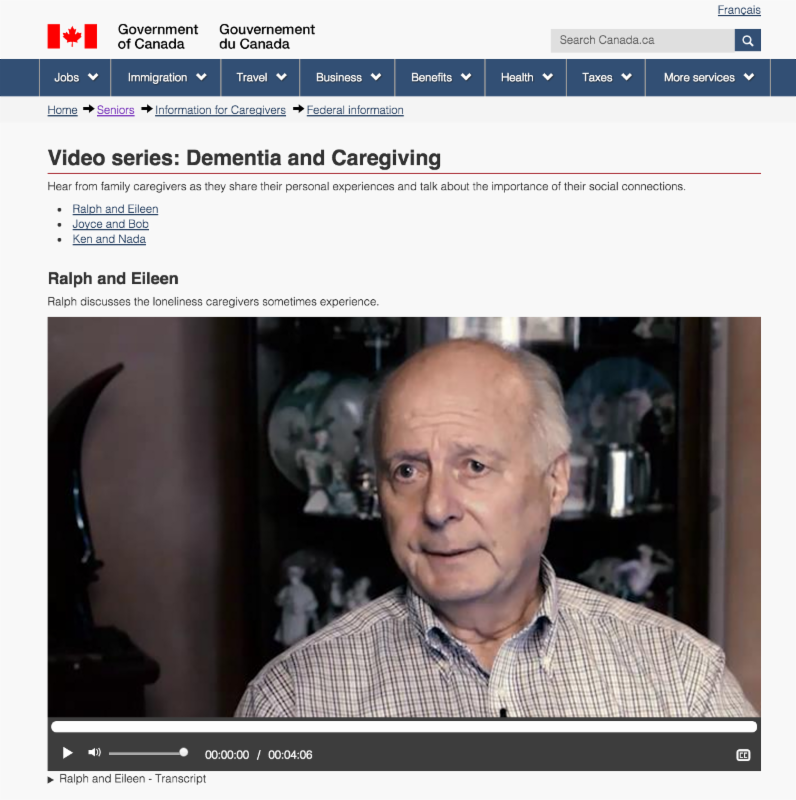 To raise awareness for Alzheimer’s Month and to acknowledge the significant role of family caregivers, Employment & Social Development Canada has launched a video series regarding dementia and the significant role of caregivers. Approximately 747,000 Canadians are living with Alzheimer’s disease and other dementias, and almost 500,000 Canadians provide care to family or friends with dementia. Caregivers provide an average of 74 hours per week caring for loved ones.
The video campaign features the personal experiences of family caregivers, bringing their dedicated contributions to light, discussing important issues like the loneliness of caregiving. The videos demonstrate the significant role of caregivers in regards to maintaining social connectedness and support for those with dementia.
The Honourable Jean-Yves Duclos, Minister of Families, Children and Social Development released a statement introducing the series in honour of Alzheimer’s Awareness Month, and encouraged all Canadians to learn more about the realities of dementia care.
|
My PD Journey:
Multi-Stakeholder Initiative on Parkinson’s Disease
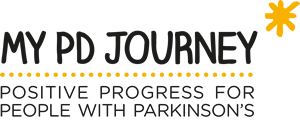 Parkinson’s disease (PD) is a progressive, chronic and complex neurodegenerative disease with no cure. There are around 1.2M living with PD in Europe, and the annual estimated cost of the disease is 13.9BN euros.
«My PD Journey» is a pan-European, multi-stakeholder coalition of umbrella patient organisations, key Parkinson’s disease specialists and pharmaceutical/treatment companies. It is led by the European Parkinson’s Disease Association (EPDA) with initial funding provided by AbbVie via its Strategic Health Initiatives Programme. The coalition now includes five pharmaceutical/treatment companies: AbbVie, Boston Scientific, Britannia, Medtronic and UCB.
My PD Journey’s objective is to create a sustainable environment that ensures people with Parkinson’s receive optimal and timely access to diagnosis, treatment and care throughout the progression of their disease. This has been achieved thanks to the largest piece of qualitative and quantitative research into the needs and views of PD patients ever undertaken across Europe, with almost 1,800 respondents.
This research led to a European Inventory, which detailed (a) where gaps in Parkinson’s care pathways exist while (b) highlighting examples of good practice that could be replicated elsewhere to address those gaps. These examples were then used to develop European good practice guidelines, which have been endorsed by patient groups and clinical bodies such as the European section of the International Parkinson and Movement Disorder Society (MDS-ES).
More information about My PD Journey can be found here.
|
Dublin City University’s Age-Friendly Universities Initiative
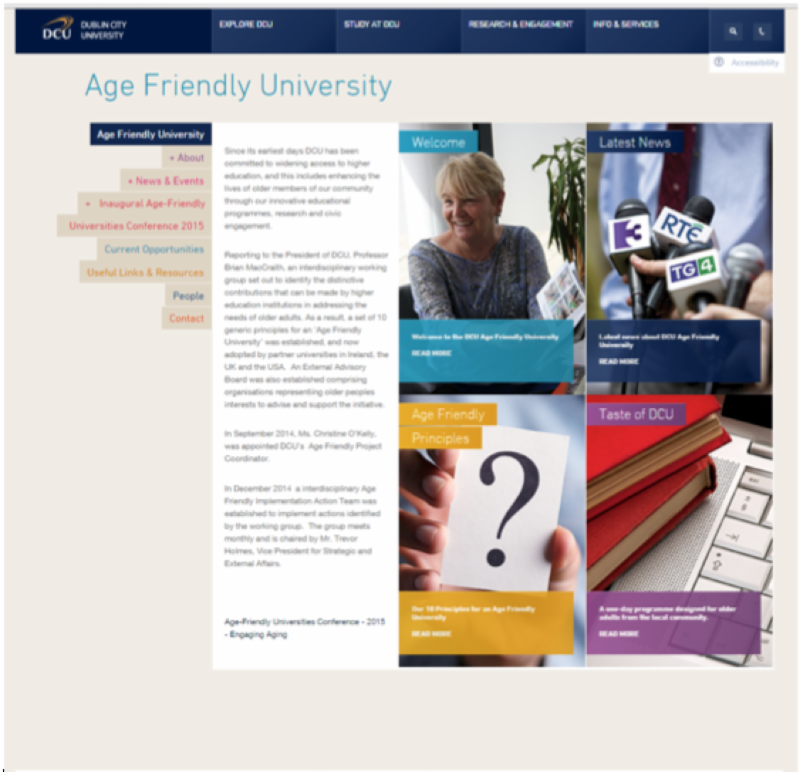 Dublin City University Dublin City University
(DCU) has committed to lead and highlight the role that universities can play in responding to challenges and opportunities associated with the ageing demographic of the 21st century by establishing the concept and principles of an Age-Friendly University (AFU).
Although Ireland has the lowest proportion of over 65’s in Europe (11%) compared to the rest of Europe, by 2041 this figure will have doubled to 22%. As a research intensive globally-engaged university, DCU’s strategic plan to transform lives and societies responds to the challenges of an ageing demographic by creating and leading a network of AFUs to maximize the opportunities to work with a multidisciplinary approach on ageing issues collaboratively on a global scale. Creating opportunities for older people to access higher education and to provide opportunities for mentoring and mutual learning is a key objective of the Age-Friendly Initiative.
As part of the AFU Initiative a range of courses aimed at older learners will be offered on a single module basis in Spring 2016. These modules will be undergraduate modules with no entry requirements. Each module is worth 5 credits and can be completed in a single semester (February — May), which will provide an opportunity to build towards an award rather than commit to a four year full time programme. This initiative compliments DCU’s online learning, intergenerational and community programmes.
Further information about the AFU initiative can be found here.
|
Silver Spaces: Ageing in Place Home Assessment App
The newly released Silver Spaces™ app is a simple mobile application for seniors, families, health professionals, remodelers, builders, service providers and those who care about and for seniors. Safety and security in the home becomes a valid concern as the population ages and this app offers a room by room checklist, both interior and exterior, that defines what changes could be made to make it more resident-friendly. The app asks targeted questions about all areas of the home and provides rationale for each question, explaining why it is important for security. Photos and notes can be uploaded during the evaluation.
When the assessment is complete, a report and checklist is created that can be utilized to make simple changes or alterations to a home, or to undertake complex upgrades or remodeling. As a fringe benefit, the app includes a downloadable, detailed functional assessment that assists in identifying any physical, financial, transportation, mobility or other issues the resident may have that could impact the decision to remain in the home.
Silver Spaces is available worldwide for $5.99 in the U.S. and is priced accordingly in other regions. Release to the Android market is set for January 2016 and the professional tablet version, Silver Spaces Pro, has a spring, 2016 release date.
|
Starting with Sustainability:
A Framework for Age Friendly Communities
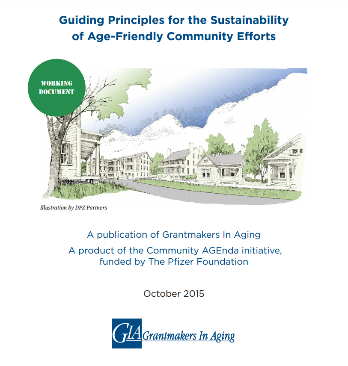 During the last decade, the age-friendly communities movement has grown significantly both in the United States and abroad. Creating truly great places to grow up and grow old, however, requires a sustained investment in infrastructure, programs, and services well beyond traditional philanthropic support, one off government funding, and modest volunteer contributions. The 32-page publication, a capstone of GIA’s Community AGEnda initiative supported by The Pfizer Foundation, is filled with practical examples from communities in the US and around the globe. The framework was developed with input from more than 30 leaders in the age-friendly field, including IFA’s own Greg Shaw.
The full report can be accessed here.
|
«RELEASED» Final Draft of the WHO Global Strategy and Action Plan on Ageing and Health
The World Report on Ageing and Health calls for a fundamental shift in perceptions about ageing and outlines an action framework to foster Healthy Ageing around the concept of functional ability. These actions will provide valuable social and economic returns, by enabling older people to participate in society, improving their health and well-being. The Action Plan was developed based on consultations that aimed to gather input on key goals, strategic objectives, stakeholder commitments and progress indicators for healthy ageing. Almost 200 participants joined the global consultation meeting in October of 2015, bringing together 75 delegations from Member States, 35 non-governmental organizations, older people, representatives of UN and international agencies, WHO Regional
Offices and experts from a diverse range of research institutions and organizations.
The document is now available in all official languages and can be viewed here.
|
Generations United Receives the 2015 Eisner Prize for Intergenerational Excellence
The Foundation acknowledged the significant contributions of Generations United in bringing about positive change for communities by stimulating collaboration among generations.
|
|
|
Ms Donna Butts,
Executive Director of Generations United
|
As Generations United celebrates its 30th anniversary, Executive Director Ms Donna Butts states: «We are so proud to receive this prestigious recognition by a foundation that shares our deep belief that we can only be successful in the face of our complex future if generational diversity is regarded as a national asset and fully leveraged.»
The IFA was pleased to have Ms Donna Butts attend the Adult Immunization Advocacy Champion Summit, where she presented about the life-course approach to vaccinations focusing on how improving the lives of children, youth and older adults through intergenerational collaboration, public policies and programs in vaccination will ensure healthy ageing for all.
To learn more about Generations United, click here.
|
Super-Aged Japan Taps Benefits of Graying Workforce
An article recently published by the China Daily highlights the multifaceted benefits of including older people in the workforce.
In the industrialized world, Japan has one of the highest labour force participation rates for older people, with approximately 10.6% of people aged 65 and over still working. In 2013, Japan increased the mandatory retirement age to 61, and it will be incrementally raised to 65 by 2025.
A report by the World Bank warned that East Asia is ageing faster than other areas. Globally, Japan has one of the lowest birthrates and longest life expectancies. The report warns that the working-age population will decrease by 10% by 2040 unless reforms are implemented.
Working longer is beneficial in order to maintain health and prevent hospitalization of older people, as well as to address issues of a shrinking workforce and retirement security. Working longer contributes to economic growth and benefits the workforce through the sharing of knowledge and skills.
The full article on Japan’s ageing workforce can be accessed here.
|
|
|
|
|
